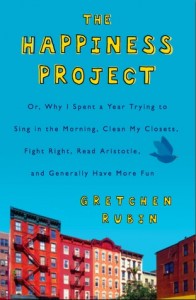 I just finished reading “The Happiness Project: Or, Why I Spent a Year Trying to Sing in the Morning, Clean My Closets, Fight Right, Read Aristotle, and Generally Have More Fun” by Gretchen Rubin. The book starts with the basic question, “Are you happy?” Then it goes on to a second question, “Whether you are or not, can you become happier?” Gretchen Rubin is a woman who was happy with her life – two books published, loving husband, two adorable daughters – but she sets out to discover if she could be even happier. The Happiness Project consists of 11 areas where Rubin feels she could be happier, writing concrete resolutions for each area. Then she spends a month on each area and reports the results in the book. “The Happiness Project” became a bestseller and has given rise to two follow-up books, “Happier at Home” and “Better than Before.” She also has a popular blog about The Happiness Project with advice on how to do your own Happiness Project.
I just finished reading “The Happiness Project: Or, Why I Spent a Year Trying to Sing in the Morning, Clean My Closets, Fight Right, Read Aristotle, and Generally Have More Fun” by Gretchen Rubin. The book starts with the basic question, “Are you happy?” Then it goes on to a second question, “Whether you are or not, can you become happier?” Gretchen Rubin is a woman who was happy with her life – two books published, loving husband, two adorable daughters – but she sets out to discover if she could be even happier. The Happiness Project consists of 11 areas where Rubin feels she could be happier, writing concrete resolutions for each area. Then she spends a month on each area and reports the results in the book. “The Happiness Project” became a bestseller and has given rise to two follow-up books, “Happier at Home” and “Better than Before.” She also has a popular blog about The Happiness Project with advice on how to do your own Happiness Project.

I found “The Happiness Project” interesting and absorbing for the first six months (chapters 1 – 6) as Gretchen aimed to boost energy, be happier in her marriage, aim higher in her work, lighten up in her parenting, remember to play, and make time for her friends. Gretchen Rubin is very organized and methodical, and I can identify with that. Her resolutions chart, where she kept track of how she did on her resolutions each day, sounded just like something I would think to do, especially when I was younger. This was a systematic approach to happiness that made sense to me.
However, about halfway through the book I lost interest. I had to force myself to read the final chapters. August, September, October and November all seemed redundant. She wanted to increase her happiness through contemplating eternity, but she is not a religious person and did not try prayer or going to church. Also, her constant emphasis on her adult rule #1 – Be Gretchen – seemed very self-absorbed. Of course, we cannot be someone other than who we are, but sometimes we have to suppress one part of ourselves (our sinful nature) in order to grow in the other parts and thus, grow in happiness.
There are some parts of the book I found very helpful. I especially like the Four Splendid Truths of Happiness:
1. “To be happy, I need to think about feeling good, feeling bad, and feeling right, in an atmosphere of growth.” The atmosphere of growth part of this especially pushes me. Now that I am retired I have leisure to work on growth instead of being forced to do it through my work. But will I take advantage of my opportunities?
2. “One of the best ways to make yourself happy is to make other people happy. One of the best ways to make other people happy is to be happy yourself.” This is a very biblical approach. Instead of focusing on self first, I focus on God first, others second, and myself third. But one of the best gifts I can bring to God and to others is to be happy / joyful / content in all circumstances.
3. “The days are long but the years are short.” Every year this grows more true. We need to live in the moment and appreciate the moments we have instead of thinking that our happiness will come at some future date when this or that happens.
4. “You’re not happy unless you think you’re happy. You’re happy if you think you’re happy.” Decide to be happy and act that way. Then you will be happy. Not complicated – but not easy.
There are many good things in “The Happiness Project” about how to be happy. Live in the moment. Appreciate the blessings and people God has placed around you. Don’t nag. Be patient with others (cut them some slack). Enjoy your work. There are wonderful quotes in the book. Samuel Johnson is quoted often. If you aren’t familiar with Samuel Johnson, he was a fascinating man who suffered from depression and Tourette’s Syndrome and flirted with debtor’s prison most of his life. Yet he became one of England’s most influential writers and published a dictionary that was the standard English dictionary until the Oxford Annotated Dictionary.
“The Happiness Project” is worth reading, especially if you would like to become a happier person (which we all could do). It can help you review your life and describe the areas of your own life where you could use a happiness boost. Just remember one of the most important things about increasing your happiness: don’t take yourself too seriously!
What do you think? What is your secret to happiness? What really makes you happy? How could you be happier (and why aren’t you doing it)?
